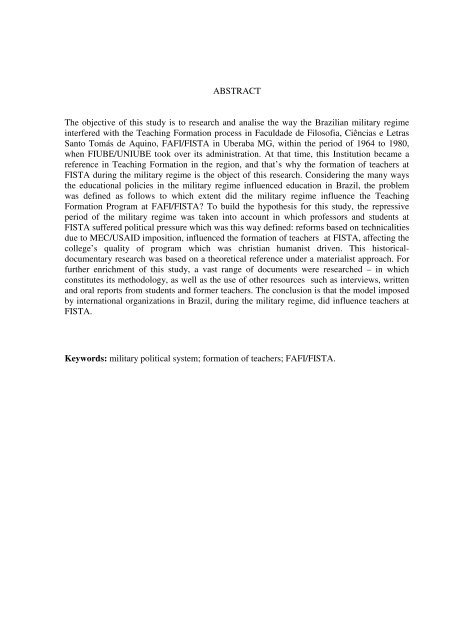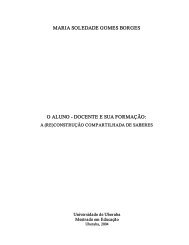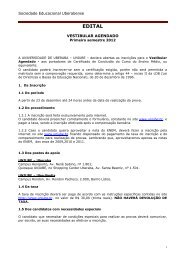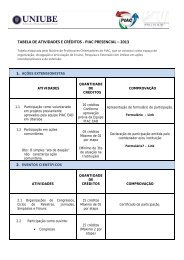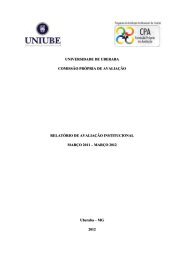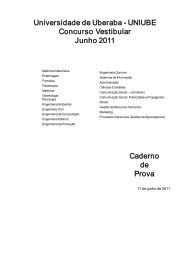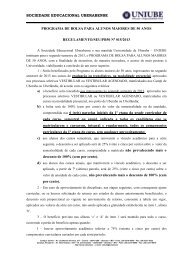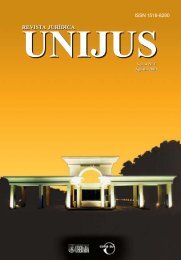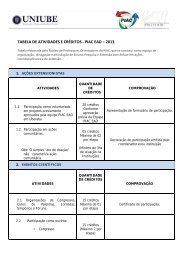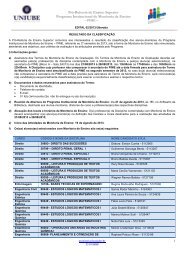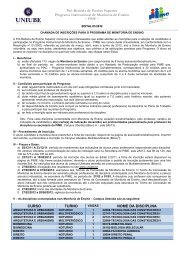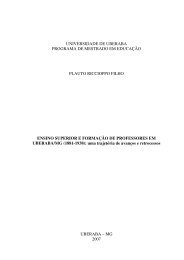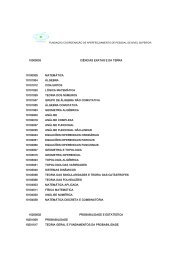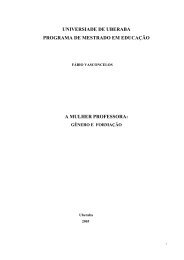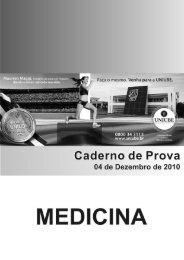- Page 1 and 2: UNIVERSIDADE DE UBERABA PROGRAMA DE
- Page 3 and 4: 2 Catalogação elaborada pelo Seto
- Page 5: 4 RESUMO Este estudo objetivou comp
- Page 9 and 10: 8 Eu queria que cada trabalhador pu
- Page 11 and 12: 10 POLOP: Partido Operário Liberta
- Page 13 and 14: 12 LISTA DE FIGURAS FIGURA 1 - Loca
- Page 15 and 16: 14 SUMÁRIO INTRODUÇÃO...........
- Page 17 and 18: 16 INTRODUÇÃO O regime militar fo
- Page 19 and 20: 18 rede pública estão associadas
- Page 21 and 22: 20 esquerda foram duramente persegu
- Page 23 and 24: 22 com os fatos e com os relatos do
- Page 25 and 26: 24 realidade. Com o objetivo de com
- Page 27 and 28: 26 de pós-graduação como esses c
- Page 29 and 30: 28 Mais uma vez afirmamos que, ness
- Page 31 and 32: 30 Sobre a história de Uberaba, fo
- Page 33 and 34: 32 1 UBERABA: DE ARRAIAL DO SERTÃO
- Page 35 and 36: 34 anteriormente por grupos nativos
- Page 37 and 38: 36 mercadorias destinadas à proví
- Page 39 and 40: 38 a crise econômica, seus latifun
- Page 41 and 42: 40 clientelismos e nepotismo. Em no
- Page 43 and 44: 42 Em Mendonça (1974, p. 107) enco
- Page 45 and 46: 44 inaugurada a escola profissional
- Page 47 and 48: 46 instalada na antiga chácara do
- Page 49 and 50: 48 Se a necessidade do mercado gero
- Page 51 and 52: 50 Após a fundação das faculdade
- Page 53 and 54: 52 No setor educacional do ensino s
- Page 55 and 56: 54 2 REGIME MILITAR: REFLEXOS NA ED
- Page 57 and 58:
56 permitiu algumas concessões às
- Page 59 and 60:
58 instruções de forma eficiente
- Page 61 and 62:
60 Para este autor, a escola só te
- Page 63 and 64:
62 Outra ênfase equivocada referia
- Page 65 and 66:
64 Mas não era esse o modelo de ed
- Page 67 and 68:
66 Movimentos Eclesiais de Base da
- Page 69 and 70:
68 Entendemos que as políticas pú
- Page 71 and 72:
70 ameaça às suas condições mí
- Page 73 and 74:
72 estatais foram privatizadas e os
- Page 75 and 76:
74 argumentação, entre outros com
- Page 77 and 78:
76 3 FAFI/FISTA - UMA EXPERIÊNCIA
- Page 79 and 80:
78 A própria Igreja Católica, pro
- Page 81 and 82:
80 Sob a influência desse órgão,
- Page 83 and 84:
82 pesquisas nos vários domínios
- Page 85 and 86:
84 Em 07 de março de 1949, dia de
- Page 87 and 88:
86 Além da sólida formação cult
- Page 89 and 90:
88 influenciar o meio cultural uber
- Page 91 and 92:
90 conteúdo ministrado no semestre
- Page 93 and 94:
92 a verdadeira revolução e trans
- Page 95 and 96:
94 Libertadora, a politização é
- Page 97 and 98:
96 do Banco Nacional e um dos artic
- Page 99 and 100:
98 consciência da realidade sócio
- Page 101 and 102:
100 No entendimento de Mário Franc
- Page 103 and 104:
102 conforme os depoimentos dos ent
- Page 105 and 106:
104 representantes da nascente AP e
- Page 107 and 108:
106 Aquino. Em primeiro de abril, d
- Page 109 and 110:
108 MOBRAL. Abriu escolas para toda
- Page 111 and 112:
110 para redemocratizar o movimento
- Page 113 and 114:
112 Os interventores convocaram uma
- Page 115 and 116:
114 cristo do povo, de Márcio More
- Page 117 and 118:
116 trabalhar na instituição. A f
- Page 119 and 120:
118 por um grupo reduzido e virou a
- Page 121 and 122:
120 refletir face à sociedade e ao
- Page 123 and 124:
122 Com as reformas, as Universidad
- Page 125 and 126:
124 abordei a Segunda Guerra Mundia
- Page 127 and 128:
126 criação dos cursos de pós-gr
- Page 129 and 130:
128 tinham sempre este cunho de ins
- Page 131 and 132:
130 3.7 O desaparecimento da FISTA:
- Page 133 and 134:
132 Na década de 70, havia um adia
- Page 135 and 136:
134 pedagógico da FISTA. Muitos al
- Page 137 and 138:
136 CONSIDERAÇÕES FINAIS Compreen
- Page 139 and 140:
138 Libertadora Nacional (ALN) e fo
- Page 141 and 142:
140 influenciaram a formação de p
- Page 143 and 144:
142 qualitativamente as condições
- Page 145 and 146:
144 BORGES SAMPAIO, Antônio. Ubera
- Page 147 and 148:
146 GRAMSCI, Antônio. Os Intelectu
- Page 149 and 150:
148 ______, Dermeval. O legado educ
- Page 151 and 152:
150 APÊNDICE 1 ROTEIRO DE ENTREVIS
- Page 153 and 154:
152 6-Maria Antonieta Borges Lopes
- Page 155 and 156:
154 APÊNDICE 3 TRANSCRIÇÃO DAS E
- Page 157 and 158:
156 conseguiram calar a todos. Para
- Page 159 and 160:
158 lançado, para atender a demand
- Page 161 and 162:
160 Danival Roberto Alves Entrevist
- Page 163 and 164:
162 a História, a Geografia, as ch
- Page 165 and 166:
164 Euphranor Ferreira Martins Juni
- Page 167 and 168:
166 Quanto às perseguições polí
- Page 169 and 170:
168 minha estada na região Norte,
- Page 171 and 172:
170 Desejo a todos os mestrandos qu
- Page 173 and 174:
172 Embora não tenha participado d
- Page 175 and 176:
174 Também no ensino de primeiro g
- Page 177 and 178:
176 Maria Élida da Silva Entrevist
- Page 179 and 180:
178 de ver um aluno voltar com uma
- Page 181 and 182:
180 Maria de Lourdes Melo Prais Ent
- Page 183 and 184:
182 dialogado, você sabia para que
- Page 185 and 186:
184 da formação consistente. Falt
- Page 187 and 188:
186 mediador foi o arcebispo Dom Al
- Page 189 and 190:
188 Newton Luís Mamede Entrevista
- Page 191 and 192:
190 repressão e prisões (desapare
- Page 193 and 194:
192 Domingos, em Uberaba). Em 1976,
- Page 195 and 196:
194 colégios através dos grêmios
- Page 197 and 198:
196 professor de Filosofia e OSPB,
- Page 199 and 200:
198 acontecendo, mas, tomava cuidad
- Page 201 and 202:
200 Paulo Roberto Ferreira Entrevis
- Page 203 and 204:
202 Muitas, além de um ensino sér
- Page 205 and 206:
204 Nos anos de 60 e 70, a influên


